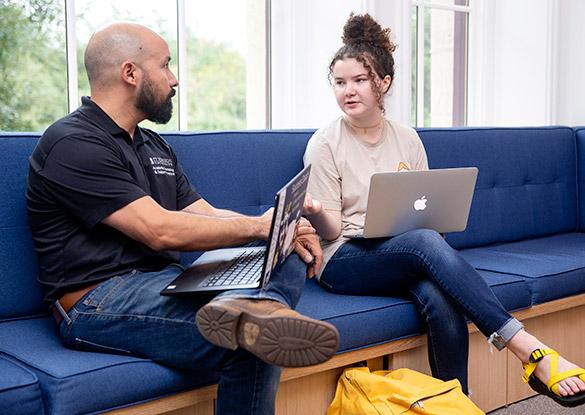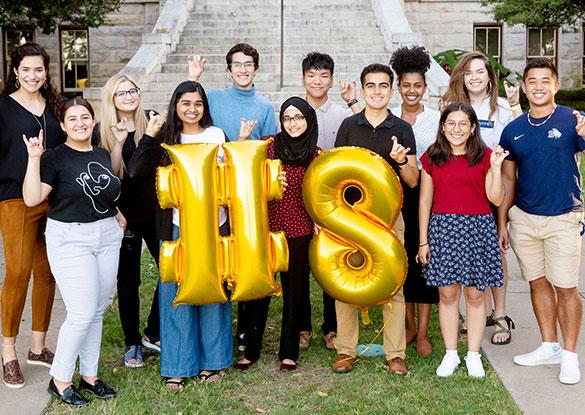Become a healthcare detective.

Major Roadmap
Explore your options — classes, internships, research and study abroad. Find what interests you, discover what you love, and create a major experience that jumpstarts your future utilizing the Medical Laboratory Science Major Guide.
As a Medical Laboratory Science major, you’ll learn to analyze blood, urine, and other body tissues and fluids to diagnose disease. Your work as a laboratory professional will help people take control of their health and contribute to vital research. Don’t be surprised if you’re hired before graduation — this is a career field in high demand.
Pair courses like microbiology, clinical chemistry and molecular biology with clinical training at the Austin State Hospital. There, you’ll learn medical testing procedures like phlebotomy, immunology and urinalysis. Get hands-on experience that prepares you to immediately start your career in a hospital or clinical research laboratory, or at a biotechnology firm, government agency or forensic laboratory. You’ll use your scientific knowledge to help advance human health — at the individual and societal level.
What do our graduates do?
With a Medical Laboratory Science major, you can go on to a variety of careers and graduate schools. Here’s a sample.
- Research coordinator
- Lab manager
- Consumer-product tester
- Research developer
- Crime lab specialist

8 Reasons to Choose St. Edward’s
St. Edward’s is the No. 8 Best Regional University in the West in the 2020 U.S. News & World Report college ranking. In honor of our ranking, we share the top reasons to become a Hilltopper.
The Classroom and Beyond
The Medical Laboratory Science program prepares you to spend your last year of college immersed in a hands-on, hospital-based clinical training program. Your other three years at St. Edward’s will be full of science courses with labs, research opportunities, and time to build relationships with fellow Hilltoppers through clubs focused on science, service and health.
Experiential Education
You’ll learn the fundamentals of laboratory research and the scientific method in your science courses at St. Edward’s.
In your freshman Biology lab, you’ll start to develop your laboratory skills and learn how to construct and answer a scientific question. Previous classes have collected and analyzed water samples from locations near campus and used their data to answer distinct research questions. At the conclusion of your work, you’ll learn how to present your findings to your peers.
In Microbiology, you’ll continue to build your lab skills through a project like determining whether a particular plant extract inhibits bacterial growth. Although St. Edward’s students have been testing plant extracts for antimicrobial properties for many semesters, you’ll be testing one that has not been analyzed before. This project gives you a chance to experience real-life research, where no one knows the outcome.
Teaching Assistantships
Students with an affinity for teaching and mentorship can assist younger students by serving as teaching assistants. At St. Edward’s, all classes are taught by professors, but student teaching assistants help their fellow students develop lab skills and technique. You’ll expand your communication skills and improve your own lab skills by helping other people learn the material.
Student Organizations
The St. Edward’s chapter of the Texas Academy of Science supports student research, including presentation and publication opportunities. Members also tutor in the sciences and complete other service projects.
Students with strong academic achievement in the sciences are eligible to join the St. Edward’s chapter of Beta Beta Beta, the National Biological Honor Society.
The student chapter of the American Society for Microbiology attends regional ASM meetings together and took a field trip to UTMB to learn about the master’s program and life in Galveston. The group invites guest speakers, watches documentaries (such as about antibiotic resistance) and plans special events like a reception with fermented foods.
Degree Requirements
Coursework establishes fundamental knowledge in such disciplines as microbiology, hematology, immunology, clinical chemistry and molecular biology. Research and clinical training at the Austin State Hospital allow students to pursue personal interests and develop skill sets that align with professional objectives.
Major Requirements: The BS in Medical Laboratory Science requires 53-54 hours of major courses. Requirements include a combination of Biology, Chemistry and Math. In addition, 30 hours of coursework is taken at Austin State Hospital, including Microbiology, Hematology, Clinical Chemistry, Coagulation, Phlebotomy, Blood Bank/Immunology/Serology, and Urinalysis.
General Education Requirements: In addition to the major program requirements, all students must satisfy the general education requirements. Talk with your success coach and faculty advisor about which courses are right for you.
View and download the full degree plan for the Medical Laboratory Science major (PDF).
A few examples of courses students in this major take:
- Microbiology - Microbiology is the study of microorganisms with an emphasis on their structure, function, and role in sickness, health and research. Concurrent enrollment in BIOL 3139 or instructor approval is required. Prerequisites: Eight hours of Biology numbered BIOL 1307 or above and BIOL 2334
- Immunology - Immunology is the scientific discipline that seeks to understand the nature of the human immune system. The immune system is of paramount importance to the success of humans,
as the human body is inundated daily by a multitude of potentially pathogenic microorganisms that left unchallenged would quickly destroy all human bodies. Throughout this course the student will discover the molecular nature of the human immune system including the cellular and noncellular components involved and how these factors interact to combat disease. Prerequisites: BIOL 2334. Spring, odd-numbered years.
Interested in earning a Master of Science in Clinical Laboratory Science? Learn more about our dual degree program.
Research
All Medical Laboratory Science students have the opportunity to conduct research and present their work at symposia on campus or at conferences like the Texas Academy of Science. Undergraduate research teaches you to work independently and analyze scientific literature, which will prepare you to succeed in the 3+2 program at UTMB in Galveston.
Outstanding students complete Research Experiences for Undergraduates, in which they join the lab of a professor at a major research university over a summer. These competitive 10-week experiences, funded by the National Science Foundation, introduce you to research with different mentors and help you evaluate whether a research career is right for you.
Internships
You’ll finish your degree by completing classes and rotations at one of three clinical sites, to which you apply your junior year. Here, you’ll do exactly the same kind of work you’ll do as a professional, making you a strong candidate for jobs in the field.
Austin State Hospital is a public psychiatric facility a few miles north of St. Edward’s. If you enter this clinical program, you’ll study in classes with fewer than 10 other students. At ASH, you’ll learn how to analyze samples used to monitor patients’ medication levels, check for markers that would indicate negative side effects, and assess patients’ overall health. You’ll also complete rotations at other sites, such as the local blood bank, where you’ll learn how to do blood typing and analyze blood chemistry, and Dell Seton Medical Center, Austin’s safety-net and teaching hospital. There, you’ll work in divisions including blood chemistry, microbiology, parasitology and blood and tissue typing.
The University of Texas Medical Branch in Galveston has an agreement with St. Edward’s through which students can earn two degrees in five years. Students complete three years at St. Edward’s and two years of clinical training at UTMB. Through this program, you can earn a bachelor’s degree in Biology from St. Edward’s and a master’s degree in Clinical Laboratory Science from UTMB. If you successfully complete all your prerequisites at St. Edward’s, you will be accepted automatically to UTMB. If you pursue this path, you will move to Galveston after your third year of college to experience life in a beach city and build a new network of colleagues and friends in the medical community.
St. Edward’s also has a partnership with Baylor Scott and White Medical Center in Temple, where you can spend your last year of college learning how to conduct clinical tests. Your rotations will include the labs at BS&W Medical Center as well as the healthcare system’s hospitals in Round Rock and Waco and the Veterans Affairs hospitals in Temple and Waco. For this program, you would probably move to Temple – an hour’s drive from Austin in light traffic – to reduce commuting time, participate fully in the life of the community and build your network in the field.
Our Faculty

"Laboratorians are essential members of the healthcare team. They receive the latest training and provide evidence that is necessary to make diagnoses. These professionals are very much in demand and frequently hired before they finish their degree."
– Dr. Trish Bayham, Advisor for Medical Laboratory Science